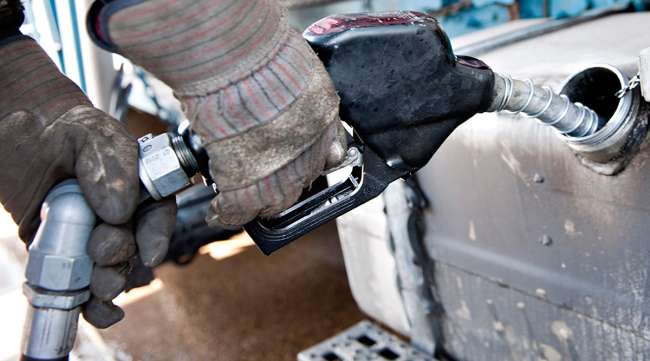Staff Reporter
Diesel Climbs 0.1¢ to $3.074 a Gallon

[Stay on top of transportation news: Get TTNews in your inbox.]
The U.S. average retail price of diesel rose 0.1 cent to $3.074 a gallon, the Department of Energy reported Nov. 18.
Trucking’s main fuel costs 20.8 cents less than it did a year ago, when it was $3.282 a gallon, according to DOE.
Regional average diesel prices rose in all areas except the Midwest, the Gulf Coast and the West Coast.
Diesel prices rose the most in the Rocky Mountain region, where prices jumped 2.9 cents to $3.232 per gallon. Prices fell the most along the Gulf Coast, where prices dropped 0.3 cent to $2.792 per gallon.
Gasoline dropped nationally by 2.3 cents to $2.592 per gallon. Gasoline is 1.9 cents cheaper than a year ago, when it cost $2.611 per gallon.
Gasoline prices fell in all regions, except the Rocky Mountains, where prices jumped 1.6 cents to $2.835 per gallon. Prices fell the most on the West Coast, dropping 5.1 cents to $3.540 per gallon.
West Texas Intermediate for December delivery rose $1.90 to settle at $57.11 a barrel on the New York Mercantile Exchange on Nov. 20. Brent oil for January settlement gained $1.49 to close at $62.40 a barrel on the London-based ICE Futures Europe Exchange.
A key reason why oil has not rallied higher is traders’ fears that the market is saturated with crude oil, said Phil Flynn, an oil analyst with Price Futures Group of Chicago, who noted that even tensions in the Middle East haven’t given traders the jitters.

Flynn
“Geopolitical headlines don’t move us as much when you think you are oversupplied,” Flynn told Transport Topics.
And gasoline supply is also up. A recent report by the DOE’s Energy Information Administration showed gasoline inventories rose 1.76 million barrels while distillate supplies fell 974,000 barrels. Crude production remained strong at a record level of 12.8 million barrels a day for the second week in a row, Bloomberg reported.
“The market seems to be concerned about the U.S.-China trade talks,” said Michael Loewen, director of commodity strategy at Scotiabank in Toronto, speaking to Bloomberg. “There is some pessimism surrounding it, particularly over President Trump’s reluctance to roll back on tariffs for China’s goods.”
Flynn believes diesel prices and oil prices will move higher as more Americans who use heating oil for the winter begin soaking up supplies. World refineries also need to eliminate higher-sulfur bunker fuel for ships by Jan. 1. A mandate by the International Maritime Organization means there will be a scramble for distillates, and that means competition for oil to use for both lower-sulfur shipping fuel and diesel.
Because of that coming IMO mandate, “you would think diesel prices would be going through the roof,” Flynn said. Eventually, the pressure will push diesel up, Flynn predicted.
Another rally for oil could be caused if the United States and China agree to hammer out a trade deal, ridding the nations of the tariffs that both have slapped on each other’s various goods. The tariff spat cannot go on forever, Flynn said, and when it ends, trade will increase, and the world economy will improve, causing oil demand to increase.
“I think we are close to a deal,” Flynn said. “China needs a deal.”
With oil and diesel prices uncertain, Penske Truck Leasing is working to help its customers conserve fuel.
“Penske provides many methods for our customers to maximize diesel fuel savings,” said Drew Cullen, senior vice president of fuels and facility services for Penske Transportation Solutions, in an email to TT. “Spec’ing the vehicle for fuel efficiency, ensuring the vehicle is properly maintained — and telematics systems, which can help influence driver speed management and efficient routing — are all items we help customers manage to control fuel spend.”

Cullen
Also important is work improving the company’s maintenance programs to help customers improve fuel efficiency, he said.
Cullen noted that the winter months can bring unique fuel challenges to fleets. “Supply disruptions, such as those during inclement weather, can lead to significant business disruptions,” he said. “Our business continuity plans, which include daily planning, supplier and carrier relationships, and a robust supply network help keep our customers running during fuel supply disruptions.”
Penske’s carrier arm, Penske Logistics, ranks No. 16 on the Transport Topics Top 100 list of the largest for-hire carriers in North America and No. 8 on the TT Top 50 list of the largest logistics companies.
Want more news? Listen to today's daily briefing:




